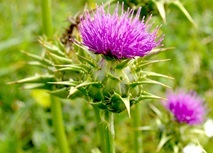Rosa Turco, Riccardo Tesser, Maria Elena Cucciolito, Massimo Fagnano, Lucia Ottaiano, Salvatore Mallardo, Mario Malinconico, Gabriella Santagata, Martino Di Serio
ACS Sustainable Chem. Eng. 2019, 7, 4, 4069–4077
https://doi.org/10.1021/acssuschemeng.8b05519
Abstract
Cardoon seed oil (CO), derived from the nonedible Cynara cardunculus plant, growing in marginal and contaminated soils of Mediterranean regions, was successfully epoxidized (ECO) in a fed-batch modality. The cost-effective and environmentally friendly oils have been used as bioplasticizers of poly(lactic acid) (PLA), to improve the overall properties and broaden its industrial applications as a biodegradable packaging material. Hence, physical blends and films of PLA, containing 3% by weight of CO and ECO, were prepared by melt extrusion and compression molding, and the effect of the both bioplasticizers on structural, thermal, and mechanical properties of the obtained films was investigated. Cardoon oils induced the decreasing of glass transition temperature due to PLA free volume enhancement. This effect was particularly marked in PLA–ECO film. Thermal stability of PLA was meaningfully improved upon addition of the oils, and the mechanical properties made evident the increase of PLA ductility, particularly enhanced in the PLA–ECO system, where the polymeric matrix and the oil showed stronger physical interaction and improved phase compatibility, as also revealed by spectroscopic and morphological analyses. Therefore, the plasticization action exerted by very low concentrations of epoxidized cardoon oil efficiently overcomes PLA drawbacks, thus encouraging the feasibility of its use as a bioplastic for packaging material.

